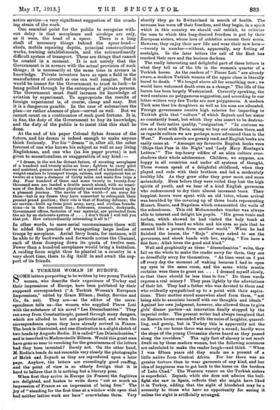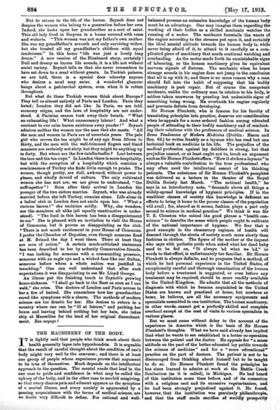A TURKISH WOMAN IN EUROPE.
SOME letters purporting to be written by two young Turkish women, who describe their experience of Turkey and their impressions of Europe, have been published by their supposed correspondent (" A Turkish Woman's European Impressions," edited by Grace Ellison ; Seeley, Service and Co., 6s. net). They are—so the editor of the corre- spondence tells us—the women who supplied Pierre Loti with the substance of his novel " Les Desenchantees." They ran away from Constantinople, passed through many dangers, which are alluded to but not particularized, and when the correspondence opens they have already arrived in France. The book is illustrated, and one illustration is a slight sketch of two heads by Auguste Rodin. It is called " Les Desenchantees," and is inscribed to Mademoiselle Ellison. Would this great man have gone so near to vouching for the genuineness of the letters had they been invented ? Surely not. On the other hand, 21.Rodin's heads do not resemble very closely the photographs of Melek and Zeyneb as they are reproduced upon a later page. Anyhow, the letters are exceedingly good reading, and the point of view is so utterly foreign that it is bard to believe that it is nothing but a literary pose.
When first they arrive in Europe (in France) the fugitives are delighted, and hasten to write down " not so much an. impression of France as an impression of being free." The joy of " standing for the first time at a window wide open that had neither lattice work nor bars " overwhelms them. Very
shortly they go to Switzerland in search of health. The newness has worn off their freedom, and they begin, in a spirit which in this country we should call cattish, to criticize the uses to which this long-desired freedom is put by their European sisters, whose love of athletics arouses their scorn. However, they enjoy their new life and wear their new hats- -twenty in number—without, apparently, any feeling of nostalgia. In the later letters the call of the East has reached their ears and the horizon darkens.
The really interesting and delightful part of these letters is what they tell us of the life in the women's quarter of a Turkish house. As the readers of " Pierre Loti " are already aware, a modern Turkish woman of the upper class is literally bored to death. " We longed above all for something new ; we would have welcomed death even as a change." The life of the harem has been largely Westernized. Correctly speaking, the word contains no polygamous suggestion, and according to our letter-writers very few Turks are now polygamous. A modern Turk sees that his daughters as well as hie sons are educated. Foreign governesses receive high salaries for imparting to Turkish girls that "culture" of which Zeyneb and her sister so constantly boast, but which they also assert to be destruc- tive of their native quality, "resignation." "In costume we are on a level with Paris, seeing we buy our clothes there, and as regards culture we are perhaps more advanced than is the West." French novels are greatly read, and English books are easily come at. "Amongst my favourite English books were Ships that Pass in the Night' and ' Lady Mary Montagu's Letters.' " The top-heavy edifice of an alien culture over- shadows their whole adolescence. Children, we suppose, are happy in all countries and under all systems of thought. These women speak of a delightful childhood, when they played and rode with their brothers and led a moderately healthy life. As they grew older they grew more and more melancholy. Even before they were veiled they lost the high spirits of youth, and we hear of a kind English governess who endeavoured to dry their almost incessant tears. Their happiest hours were spent with an old tutor, whose arrival was heralded by the covering up of three busts representing Mozart, Dante, and Napoleon which ornamented the walls of the schoolroom. This old Mohammedan teacher was always able to interest and delight his pupils. "His green tunic and turban, which showed he had visited the holy tomb at Mecca, made his beard so white and his eyes so pale that he seemed like a person from another world." When he bad finished the lesson, the " Hoja " always asked to see the governess, and shook hands with her, saying, " You have a fine face ; Allah loves the good and kind."
Well and graphically as these " desenchantees " write, they fail on the whole to make the reader sorry for them, they are so dreadfully sorry for themselves. " As time went on I put off every day the moment of waking because I had to open my eyes in the same room, and the same white muslin curtains were there to greet me. . . . I dressed myself slowly, so that there should be less time to live." Do these words express areal misery ? They pass lightly by the alleviations of their lot. They had a father who was devoted to them and who evidently sympathized up to .a point with their aspira. tions. Their mother stood somewhat aloof from them, " not being able to associate herself with our thoughts and ideals." Against her own judgment, however, she allowed them to give girls' dinner parties—an innovation finally stopped by the imperial order. The present writer had always imagined that an Eastern house resounded with the noise of laughter, quarrel- ling, and gossip, but in Turkey this is apparently not the case. "In our house there was scarcely a sound ; hardly were the steps of the young Circassian slaves heard as they passed along the corridors." The ugly fact of slavery is not much dwelt on by these modern women, but the following sentences are calculated to make the reader laugh—and think. " When I was fifteen years old they made me a present of a little native from Central Africa. For her there was no greater torture than to wear garments of any kind, and her idea of happiness was to get back to the home on the borders of Lake Chad." The Western veneer on the Turkish sisters is superficial. Zeyneb, while she does not admire the bull- fight she saw in Spain, reflects that she might have liked it in Turkey, adding that the sight of bloodshed may be a necessity to those who have no opportunity for seeing it unless the sight is artificially arranged.
But to return to the life of the harem. Zeyneb does not despise the women who belong to a generation before her own.
Indeed, she looks upon her grandmother as a sort of saint.
This old lady lived in Smyrna in a house covered with roses and wistaria. " This woman was not my father's own mother.
Sbe was my grandfather's seventh and only surviving widow,
but she treated all my grandfather's children with equal tenderness." In this home "life was just a lovely long
dream." A new version of the Bluebeard story, certainly !
Dull and dreary as harem life sounds, it is a life not without social variety. Zeyneb tells us that she never remembers to
have sat down to a meal without guests. In Turkish palaces, we are told, there is a special door whereby anyone who desires a meal may enter. A wonderful glamour hangs about a patriarchal system, even when it is rotten throughout.
But what do these Turkish women think about Europe ? They tell us almost entirely of Paris and London. Paris they hated ; London they did not like. In Paris, we are told, economy reigns, and the laws of hospitality are not under- stood. A Parisian season took away their breath. " What an exhausting life ! What unnecessary labour ! And what a contrast to our calm harem existence away yonder !" Zeyneb admires neither the women nor the men that she meets. "All the men and women in Paris are of uncertain years. The pale girl who serves the tea might be of any age from fifteen to thirty, and the men with the well-trimmed fingers and timid manners are certainly not sixty, but they might be anything up to forty. But where are the few intellectuelles? Lost between the lace and the tea.cups." In London there is more hospitality, but with the exception of a hospitality which contains a reminiscence of Turkey she finds little enough to praise. The women, though pretty, are dull, awkward, without power to please, and wholly devoid of culture. The only cultivated women she has met are, we are given to understand, " the suffragettes" ! Soon after their arrival in London the younger of the two sisters marries. Zeyneb, who was already married before she left Turkey, remains alone. Life alone in a ladies' club in London does not smile upon her. " What a curious harem !" she exclaims acidly. Why, she wonders, are the members all alike (all equally unattractive is under- stood). " The food in this harem has been a disappointment to me." She is pleased with an invitation to visit the House of Commons, but it proves as disappointing as the club. "There is not much excitement in your House of Commons. I prefer the Chamber of Deputies, even though someone fired at M. Briand the day I went there. There at least they are men of action." A certain much-criticized statesman has been described to her by ardently Conservative friends. "I was looking for someone with a commanding presence, someone with an eagle eye and a wicked face like our Sultan, someone before whom a whole nation was justified in trembling." One can well understand that after such expectations it was disappointing to see Mr. Lloyd George.
An illness put the finishing touch to Zeyneb's growing home-sickness. "I shall go back to the East as soon as I can walk," she cries. The doctors of London and Paris arouse in her a fire of hatred. She remembers how her grandmother cured like symptoms with a charm. The methods of modern science are too drastic for her. She desires to return to a country where one can be "ill at leisure," and packing her boxes and leaving behind nothing but her hats, she takes ship at Marseilles for the land of her original disenchant- ment. Bon voyage !











































 Previous page
Previous page